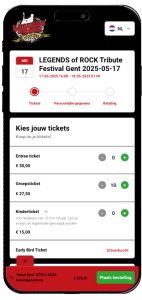Sell more tickets? 18 proven strategies for a sold-out event
How do you ensure that as many people as possible actually buy a ticket? We all face this challenge. Whether you’re organizing a festival, concert, conference, or selling tickets for a museum, a strong ticket sales strategy can make the difference between a moderately attended event and a completely sold-out edition.
Fortunately, there are countless proven strategies to boost your ticket sales. These range from marketing strategies and retargeting to exclusive deals and user-generated content.
In this article, you’ll find 18 different strategies you can apply immediately to improve your ticket sales.

1. Offer group tickets
People are social beings. They prefer to do things together. By offering group tickets, you encourage attendees to bring friends. This can be in the form of a ‘4+1 free’ deal or a discount per ticket when purchasing multiple tickets. Not only does this increase your revenue, but it also broadens your reach as attendees excite others to join.
2. Influencers & partnerships
Collaborating with influencers and brands can significantly expand your reach. Choose influencers who align with your target audience and have them promote your event through their channels. This can be done through social media posts, exclusive discount codes, or partnerships with popular brands your audience already trusts.
3. Affiliates, promoters & referrals
Referral marketing works exceptionally well to reach a broader audience. Offer promoters and affiliates commissions for every ticket sold via their unique link. People are more likely to trust recommendations from friends than advertisements.
4. Create a strong sales funnel
A well-thought-out sales funnel helps convert potential visitors into buyers:
• Awareness: Make people aware of your event through ads, influencers, and PR.
• Consideration: Show potential buyers testimonials, reviews, and past experiences.
• Conversion: Use emails, retargeting, and limited-time offers to persuade people to buy.
• Retention: Stay in touch with past attendees and offer loyalty benefits.
5. Use abandoned cart emails and ads
On average, 70-80% of visitors abandon the ticket shop without completing their purchase. By using emails and online ads targeting these individuals, you can increase total ticket sales. Studies, such as one from Opera Philadelphia, show that abandoned cart emails can achieve a conversion rate of up to 4.7%!
6. Reach out to past attendees
Send personalized emails to previous attendees with a special offer or exclusive access. People who have attended before are already familiar with your event, making them more likely to purchase again.
7. Use tiered pricing
By adding different ticket phases, such as an “early bird ticket,” you create a sense of urgency and reward buyers who act quickly. This encourages early purchases. With tiered pricing, you increase the price as the event approaches, showing that the earlier they buy, the more they save.
8. Reward loyal attendees with loyalty programs
Give loyal attendees something in return. This can be through discounts, exclusive merchandise, or VIP access for repeat purchases. This encourages attendees to keep returning and speak positively about your event. According to Loyaltyfacts.nl, visitors in a loyalty program spend 15-25% more annually than those who are not.
9. Pre-registration: create demand before sales start
Give visitors the chance to sign up in advance for ticket launches. This not only helps estimate demand but also ensures you have a list of interested buyers ready when sales open.
10. Collect and share reviews & testimonials
People trust the experiences of others. Collect and share reviews from past editions and make sure they are visible on your website, social media, and ads. User-generated content, such as photos and videos from attendees, adds credibility and increases the likelihood of ticket purchases.
11. Build an engaged community
A strong community around your event generates free word-of-mouth marketing. Use social media and WhatsApp groups to connect fans and keep them engaged.
12. Maintain ongoing interaction between attendees and your brand
Keep communicating with your audience throughout the year via social media, emails, and newsletters. Build a community around your event to maintain engagement and make it easier to reach them for future events.
13. Use lookalike audiences
With Facebook and Google Ads, you can create lookalike audiences based on past ticket buyers. This means you target ads at people with similar characteristics to your existing customers, increasing the likelihood of ticket purchases and avoiding wasted ad spend on uninterested users.
14. Limit availability with limited-time offers
Use time-limited offers, such as Black Friday sales or special short-term discounts, to create FOMO (fear of missing out) and generate a quick spike in ticket sales.
15. Use email drip campaigns
A strong email marketing strategy is essential. With a drip campaign, you send automated emails based on user behavior. Think of reminders for pre-registration, lineup announcements, and exclusive discounts.
16. Run contests and social media giveaways
Social media contests where participants can win free tickets or other prizes are an effective way to increase organic reach and build excitement.
17. Optimize your ticket shop for mobile
A large portion of purchases happen via mobile devices. Ensure that your ticket shop is mobile-friendly, loads quickly, and has a simple checkout process.
18. Strategic lineup announcements
People are more likely to buy tickets when they know which artists or speakers will be present. Plan your announcements strategically and build anticipation by revealing names in phases.
Summary: how to sell more tickets
Selling tickets is a combination of a strong marketing plan, strategic partnerships, and leveraging data and technology. By combining all these elements, you not only sell more tickets but also build a loyal community around your event.

